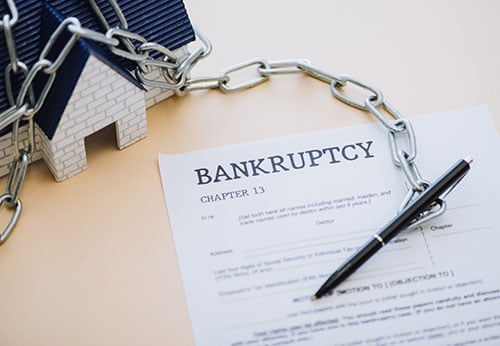 Chapter 13 of the Bankruptcy Code is also called a reorganization bankruptcy, and it allows you to propose a three- to five-year repayment plan for your debts. It helps a lot in situations where, say, you don’t want to file Chapter 7 Bankruptcy because you would lose things. Chapter 13 would give you an alternative to essentially pay back your creditors the amount that they would have received had you filed Chapter 7, without losing your assets. It also helps in situations where you are behind on payments, such as your mortgage or car loan, or where you owe taxes. In Chapter 13, you can pay those things back, and in some cases, you can even re-structure those loan agreements to pay them differently, meaning you could secure either different terms or different interest rates. In an agreement, you can sometimes change the principal amount of the loan as well.
Chapter 13 of the Bankruptcy Code is also called a reorganization bankruptcy, and it allows you to propose a three- to five-year repayment plan for your debts. It helps a lot in situations where, say, you don’t want to file Chapter 7 Bankruptcy because you would lose things. Chapter 13 would give you an alternative to essentially pay back your creditors the amount that they would have received had you filed Chapter 7, without losing your assets. It also helps in situations where you are behind on payments, such as your mortgage or car loan, or where you owe taxes. In Chapter 13, you can pay those things back, and in some cases, you can even re-structure those loan agreements to pay them differently, meaning you could secure either different terms or different interest rates. In an agreement, you can sometimes change the principal amount of the loan as well.
What Are The Eligibility Requirements To File And Complete A Chapter 13 Bankruptcy?
A Chapter 13 Bankruptcy is only available to individuals (not businesses), and those individuals must have regular income, as defined by the Bankruptcy Code. Due to the set amount of income that you are receiving each month, you can propose a repayment plan that’s going to work. When you meet with an attorney, you can determine whether you’re able to afford what you are trying to pay for—that’s the baseline judgment call that you need in order to determine if you are going to qualify for a 13, as well as for situations where you don’t qualify for a Chapter 7. Let’s say an individual makes too much money relative to their household size; in that case, the law will say they need to file Chapter 13.
The other limitation on a Chapter 13 filing is that you have to have under a certain amount of debt. That amount changes as well, but there is a certain amount of secured debt and a certain amount of unsecured debt that you are allowed to have. If you have more than either of those amounts, then you have to file a Chapter 7. Those amounts are pretty high, so most individuals don’t have that problem, though we do run into it from time to time.
What Debts Will Be Discharged in a Chapter 13 Bankruptcy?
In a Chapter 13 Bankruptcy, you can discharge anything that you can discharge in a Chapter 7, plus a few additional things such as willful and malicious injury to property debts, debts incurred to pay non-dischargeable taxes, and debts arising from property settlements in divorce or separation proceedings. Now, I do want to say that some debts are only dischargeable in Chapter 13 if they are put into your repayment plan a certain way, so that’s something to talk to your attorney about. But the discharge available to you is basically the Chapter 7 discharge, plus those three additional things that you cannot discharge in Chapter 7.
What Assets Will I Be Able to Keep After Completing a Chapter 13 Bankruptcy?
You can keep generally everything that you have in Chapter 13 throughout the case and afterward. You just have to pay for those things. If you are behind on your mortgage when you file your case, as long as you keep up with your repayment plan payments (your Chapter 13 payments and your mortgage payments), then you should be able to keep that property. The same applies with your car and other things. The difference, again, between a 13 and a 7 is that even if you are over your exempt amount for assets, the trustee is not going to sell those things in a Chapter 13. It just may make your payments higher in your case.
What Are the Major Differences Between a Chapter 7 and a Chapter 13 Bankruptcy?
As I said, Chapter 13 is longer (lasting between three and five years) and has a repayment plan, which a Chapter 7 does not. Because a Chapter 13 cannot typically have assets that are sold by the trustee, you know that if you file you are not going to lose anything. The other main difference between the two is that in Chapter 13, as opposed to Chapter 7, you can dismiss your case at any time or switch your case, in most instances, from a Chapter 13 to another chapter. Let’s say you file Chapter 13 in order to keep your home. Unfortunately, things don’t go too well, and you can no longer afford your plan or your mortgage payments. You have the option to decide to switch your case from Chapter 13 to 7. It’s still the same bankruptcy case, but switching would essentially end your case earlier and wouldn’t require you to pay anything more.
When you file a Chapter 7, you can’t always dismiss your case when you want to or switch from one to the other. If you did want to switch to a Chapter 13 or dismiss your case, you’d have to petition the court, and there would usually be a hearing. The court is not necessarily going to do what you are seeking to do in those situations. They are much more likely to let you have it your way in the 13.
The other main difference is that Chapter 7 is much shorter. As I said, it lasts for about three to four months in a no-asset case, and in an asset case, it can last longer as there is just more to do. The trustee has to sell assets and pay creditors and disclose all of that to the court. And as I said, in Chapter 7, you can lose assets if you aren’t able to exempt them under the applicable law. If you are over the $12,000 that is allowed in Maryland, you have a house that has more equity than you are allowed using the homestead exemption here, and the Tenants by the Entireties exemption is applicable to you, the trustee in a Chapter 7 case can sell your home and use the money that is generated to pay your creditors.
For more information on Chapter 13 Bankruptcy in the State of MD, an initial consultation is your next best step. Get the information and legal answers you are seeking by calling (443) 492-9003 today.

We Are Here To Help. Call Today For A No Cost Evaluation
(443) 492-9003

